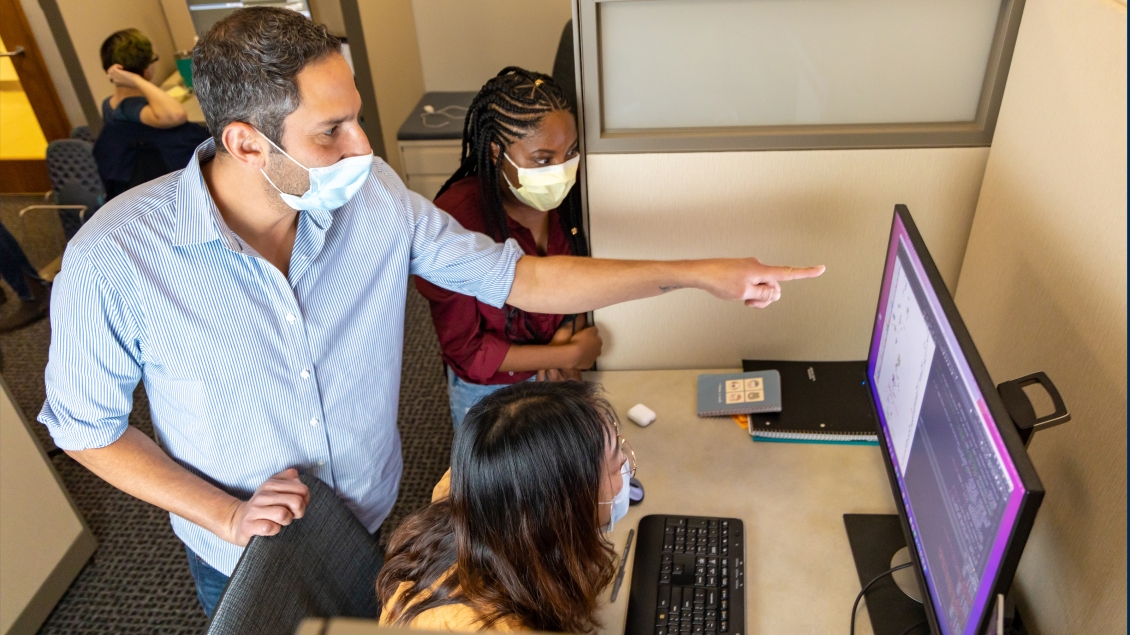-
Bioinformatics -
Biological Chemistry -
Cancer Biology -
Cell & Developmental Biology -
Cellular & Molecular Biology -
Genetics and Genomics -
Health Infrastructures & Learning Systems -
Immunology -
Microbiology & Immunology -
Molecular, Cellular & Developmental Biology -
Molecular & Cellular Pathology -
Molecular & Integrative Physiology -
Neuroscience -
Pharmacology

Pharmacology
Advancing the forefronts of new knowledge to develop novel therapeutic approaches for treatment of disease
Program Overview
Since that time, our department has awarded more PhD degrees in pharmacology than any other American university. Our graduates have made a major impact on the field of pharmacology. Among our alums are many pharmaceutical company executives, research directors and senior scientists; directors of government research labs; and recognized chairs and faculty in academia with reputations for both excellent research and teaching. A part of our tradition and a major strength of our department are the quality of our trainees and the continued commitment of our faculty to this training mission.
Our department includes more than 50 faculty who are recognized nationally and internationally for their research and instructional accomplishments. Their research interests are as diverse as are their techniques and expertise, ranging from crystallography to systems and integrated pharmacology. The high ratio of faculty to students provides excellent personal training opportunities.
More than any other basic science discipline, pharmacology is tightly connected to the understanding and treatment of human disease. At U-M, students can be involved in the discovery of new drugs, modeling of drugs and their targets, detailed studies of drug mechanisms in disease from biochemical, molecular and genetic perspectives and translational studies aimed at moving drugs into the clinic. The comprehensive nature of pharmacology at U-M allows students to focus on research areas that include:
- Cancer
- Cardiovascular Disease
- Diabetes
- Drug Discovery
- Neuropharmacology
- Addiction
Pharmacology also supports basic studies in drug metabolism, pharmacogenomics, and signal transduction.
Coursework
Pharmacology offers a broad-based training curriculum including coursework and training in basic science and translational pharmacology. Students take a course in basic principles of pharmacology along with short modular courses in specific areas of pharmacology including autonomic, endocrine, neuro, cancer, and cardiovascular pharmacology. Electives in translational pharmacology include seminars by industry scientists. We specifically train students in scientific communication through the student research seminars and scientific writing course. This comprehensive curriculum effectively prepares students for career opportunities in academic, governmental, and industrial organizations.
Preliminary Examination
In order to advance to candidacy, students write and present a short research proposal on a topic of their choosing. The exam is given in May of the second year.
Teaching Requirement
During the third year of study, students assist in the teaching of one graduate level course and have the option to teach additional courses throughout their training.
Expected Length of Program
The usual time to degree is approximately 4 to 5 1/2 years.
The Pharmacology graduate class includes on average 25 students and is diverse in its population profile. Our students publish numerous papers in prestigious journals and have received many awards from the university, industry, private foundations and professional societies. The Department of Pharmacology sponsors a variety of activities as part of the overall graduate experience including:
Training Programs
The Pharmacological Sciences Training program (PSTP) is one of the largest National Institutes of Health supported training program of its kind in the country. This interdepartmental program provides synergistic, translational education, research training, and career development with the ultimate goal of preparing graduates to excel as leaders in the field of experimental therapeutics, both in the academia and in the private sector.
Presentations at Colloquia and Awards
Two major local colloquia held each year provide students with opportunities to present their research, meet other scientists and gain skills in oral and poster presentations. Numerous award opportunities exist for students: twice-yearly travel awards, oral and poster presentation awards at the June colloquium and the annual Anthony Lu Distinguished Student Publication in Pharmacology Award.
Research / Journal Clubs / Annual Retreat
Several research / journal clubs exist including groups specializing in G-protein signal transduction and addiction. A departmental retreat is held every year providing an opportunity to update students on departmental research and to socialize with faculty.
Social Activities
Students participate in a number of activities that include Friday flag football, student-organized golf games and the December holiday party. A monthly student meeting gives students an opportunity to air any questions they have about their graduate education and network with other students in the department. This provides an important “esprit de corps” amongst all levels of departmental students.
Guest Scientists and Alumni
We are committed to provide students with unique opportunities to meet visitors and our alumni and gain from their experiences, including weekly lunches with guest seminar speakers, annual meetings with the Alumni Steering Committee, and student-led events such as Career Day.
Over 280 students have graduated with their doctoral degrees in Pharmacology from the University of Michigan. Among our alums are many pharmaceutical company executives, research directors and senior scientists; directors of government research labs; and chairs and faculty at Universities and colleges. Graduates have taken jobs in the government in diverse areas that range from research and grants management to serving as scientific advisor to senators. Others have become patent lawyers or started their own consulting firms. This success and the number of our Alumni provide an extensive network of contacts within the University of Michigan Pharmacology Family.
Learn more about the Department of Pharmacology.